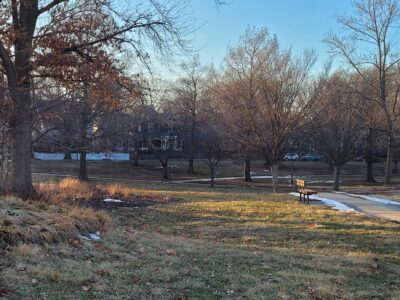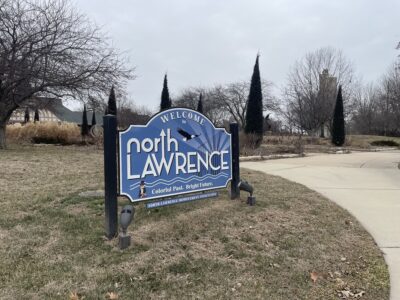Federal judge dismisses frequent public commenter’s suit against Lawrence Public Library, finding it did not violate free speech rights

photo by: Lawrence City Commission screenshot
Justin Spiehs speaks during public comment Tuesday, April 2, 2024, at the Lawrence City Commission meeting.
A U.S. district judge has ruled in favor of the Lawrence Public Library in a federal lawsuit from a frequent public commenter who claimed library staff violated his free speech rights.
Judge Julie Robinson granted summary judgment in favor of the library in a federal lawsuit Wednesday from former Lawrence resident Justin Spiehs that was filed in 2023.
Robinson found that some of Spiehs’ complaints challenging the library’s speech policies lacked standing, and that individuals mentioned in the lawsuit were entitled to qualified immunity for other complaints.
In the decision, the judge wrote that Spiehs did not provide sufficient evidence that his speech had been “chilled” by the library and its policies. A chilling of public speech is one way a plaintiff can prove a First Amendment violation has occurred. However, Robinson found that Spiehs’ own words were evidence that such a chilling of his speech had not occurred. Robinson highlighted that in an affidavit, Spiehs said he “intend(s) to return to do things that might violate all of the prohibitions of speech,” something Robinson said “dooms his claim.” She concluded Spiehs’ claims against the library “fail because the undisputed facts show that no Defendant inflicted an injury to his constitutional rights,” and since Spiehs did not “suffer a constitutional injury” she granted summary judgment in the library’s favor.
Summary judgment means that there was no material issue of fact to decide and that the case could be decided simply as a matter of law.
As the Journal-World reported, Spiehs filed the suit in 2023, alleging that he was asked by police and library security personnel to leave while he was carrying signs at two public events. At one event, which was about how new state laws affected gender markers for transgender people, the suit says police were called after Spiehs arrived, “and it was determined that Mr. Spiehs’ sign was ‘obscene'” and that he could not be at the library with the sign; he exited the building after police arrived. At the other event, which featured a drag performer reading books aloud, the suit claimed that Spiehs was told by security that he couldn’t cause a disruption at the event, and he left when two law enforcement officers showed up at the library.
In 2024, the Lawrence Public Library adopted a new free speech policy that limits certain activities — including holding signs, protesting, using expressive conduct or speech, distributing literature, acting as a public speaker, panhandling and requesting signatures, donations or contributions — inside the building if they “would interfere with study and enjoyment of visitors of the Library,” as the Journal-World reported.
Spiehs, who lives in Johnson County, had a different federal lawsuit against the City of Lawrence that alleged constitutional violations thrown out in March — also by Robinson — as the Journal-World reported. He has also sued Douglas County officials, the Lawrence school district and the City of Merriam after he was arrested for trespassing at a community center there.







